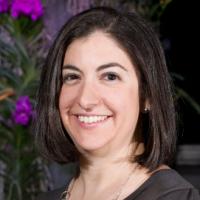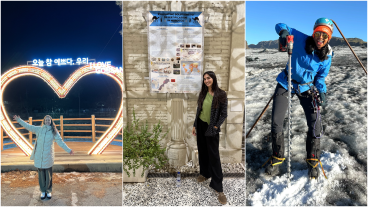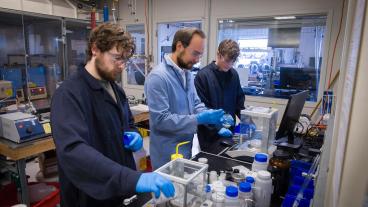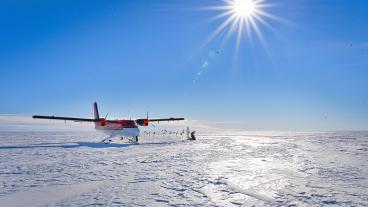Space-debris removal device wins top honors at Spring 2025 Capstone Design Showcase
Astroscale U.S. sponsored student team for work toward sustainable space exploration
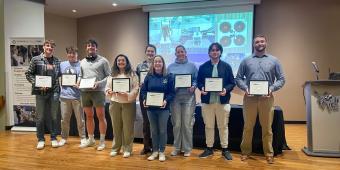
A student team that created a solution for removing debris from space won the top prize at the Spring 2025 Capstone Design Showcase, the culmination of a yearlong design experience for seniors at Colorado School of Mines.
Orbital debris ranging from old spacecraft to tiny flecks of paint poses significant risks to satellites and future space missions. Finding ways to remove that debris – without creating additional debris – is important to sustainable space exploration.
“Working on this team has been an incredible experience,” said team member Noah Palermo. “Cleaning up the orbital environment is such a challenging and important issue for humanity, and it's been really cool to see our team develop throughout the process of tackling it.”
The team targeted three types of debris and created a prototype with a four-arm claw system and synchronized rotating gears, allowing precise navigation and handling of different materials. The project was sponsored by Astroscale U.S.
Along with Palermo, members of the winning team include Angela Gabay, Ben Woody, Betsy Fellows, Emma Reinhardt, Jessica Tomshack, Noah Kelly and Walter Behaylo. The team’s faculty project advisor is Tyler Evans.
Capstone Design is a signature student experience at Mines that tasks student teams with producing creative, client-driven solutions to real-world problems. Paired with sponsors from industry, government and the broader community, students combine their knowledge in civil, electrical, mechanical, environmental and design engineering to create projects that address realistic, multidisciplinary challenges. The year-long experience ends with Capstone Design Showcase, where teams present their ideas and prototypes to sponsors, judges and members of the Mines community.
“This was my first time judging the Showcase and I was completely blown away by the diversity, complexity and completeness of the many projects,” said Mines alum Bruce Colgate ’77. “Having the multidisciplinary teams is amazing, and in discussing that aspect with the different teams I think they learned almost as much about working across the disciplines as they did in working the technical aspects of the projects, something that is so critical to success in the 'real' world.”
Second place at this semester’s showcase went to two teams: Quickswap Modular EV Powertrain – SWAP Hudson, which designed and developed a full sensor package for a Formula SAE car, and H.Y.D.R.A. – Hardened Y Drone Reprogrammable Architecture, which created a drone capable of maintaining flight amidst electromagnetic interference.
Quickswap Modular EV Powertrain – SWAP Hudson team members included Alessandro Amparan, Zavier Guardado, Lars Den Hartog, Kaleb Binger, Keegan O’Brien, Louis Bartels, Matthew Ellis, Cole Patton and Gabriel Rodriguez. Rob Reeves served as faculty advisor.
H.Y.D.R.A. – Hardened Y Drone Reprogrammable Architecture team members included James Lemons, Allison Bongiorno, Anya Kuenzli, Brandon Cooley, Logan Lindeman, Dashiell Morrison, Daemon Howard, Nicholas Adams and Ezra Taranto-Chacon. The team’s faculty advisor is Kristy Csavina.
Capstone projects were also recognized for their innovation, societal impact and proof of concept:
- Best Innovation: Active Debris Removal Solution – De-Tumbling Debris
- Best Human Systems: Sustainable Housing Concept Design
- Best Societal Impact: Wheelchair Remodel – Building to Live
- Best Environmental Impact: Golden Hill Community Cooperative Geothermal Network
- Most Inspiring for Future Engineers: Multi-Axis Race Car Simulator
- Best Proof-of-Concept: Shell Eco Marathon – Rocky Mountain Peak Efficiency
The Spring 2025 Broader Impact Essay winners were:
- First place: Hannah Ninke for “Phos Chek’s Red Stain Runs Deeper Than it Seems”
- Second place: Zoe Cremona for “Agricultural Robots: The Job Thieving Savior of Mother Earth”
- Third place: Luke Wulvik for “Power for a Connected Digital World”

